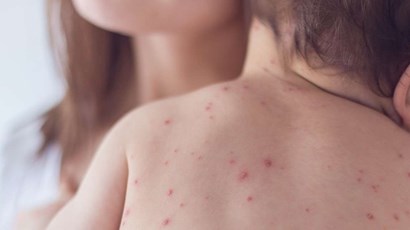Measles
Measles is an infection that mainly affects children but can occur at any age. It is rare in the UK, due to immunisation. The illness is unpleasant but most children fully recover. However, some children develop serious complications.
What is measles?
Measles is a highly infectious illness caused by a virus. The virus lives in the mucus of the nose and throat of people with this infection. Physical contact, coughing and sneezing can spread the infection. In addition, infected droplets of mucus can remain active and can be passed on by touching (they are contagious) for around two hours. This means that the virus can live outside the body - for example, on surfaces and door handles.
Measles symptoms
Once you are infected with the virus, the virus multiples in the back of your throat and in your lungs. It then spreads throughout your body. The following are the most common symptoms of measles:
- A high temperature (fever), sore eyes (conjunctivitis) and a runny nose usually occur first.
- Small white spots usually develop inside the mouth a day or so later. These can persist for several days.
- A harsh dry cough is usual.
- Going off food, tiredness and aches and pains are usual.
- Diarrhoea and/or being sick (vomiting) are common.
- A red blotchy rash normally develops about 3-4 days after the first symptoms. It usually starts on the head and neck and spreads down the body. It takes 2-3 days to cover most of the body. The rash often turns a brownish colour and gradually fades over a few days.
- Children are usually quite unwell and miserable for 3-5 days. After this, the fever tends to ease and then the rash fades. The other symptoms gradually ease and go.
Most children are better within 7-10 days. An irritating cough may persist for several days after other symptoms have gone. The immune system makes antibodies during the infection. These fight off the virus and then provide lifelong immunity. It is therefore rare to have more than one bout of measles.
Some people mistake rashes caused by other viruses for measles. Measles is not just a mild red rash that soon goes. The measles virus causes an unpleasant and sometimes serious illness. The rash is just one part of this illness.
How is measles spread?
Measles is very infectious. It is passed on by coughing and sneezing the virus into the air. It takes between 7 and 21 days (most commonly 10-12 days) to develop symptoms after being infected. (This is the incubation period.) An infected person can pass it on to others from four days before to four days after the onset of the rash. Therefore, children with measles should not mix with others and should stay off school.
What if I come into contact with someone with measles?
Some people have not been immunised against measles and therefore are at greater risk of catching measles. Also, some people are more prone to complications if they get measles. In particular:
- Pregnant women
- Young babies under the age of 12 months
- People with a poor immune system - for example:
- Those on chemotherapy.
- People taking steroid medication.
- People who have certain illnesses which affect their immune system, such as HIV.
If you or your child come into contact with someone with measles and you are in one of the groups listed above, or you have never been vaccinated against measles, you should see your doctor as soon as possible. You may be advised to have a blood test to check on your immunity to measles.
And, if necessary, you may be offered immediate immunisation or a protecting injection of antibody (immunoglobulin). This is called 'post-exposure prophylaxis'. See the guidelines from the UK Health Security Agency (UKHSA) cited at the end under 'Further Reading and References'.
How do you diagnose measles?
Your doctor will usually be able to diagnose measles from the combination of your symptoms, especially the characteristic rash and the small spots inside your mouth. However, a simple saliva test is usually done to confirm the diagnosis.
In the UK, measles is a 'notifiable illness', which means your doctor is obliged to inform the local Health Protection Team (HPT) for the UK Health Security Agency (UKHSA). This is so that they can find out where you were exposed to someone with measles, so that spread of infection can be contained. The HPT may call you to arrange testing of other people with whom you have been in contact.
What are the possible complications of measles?
Suffer from dermatitis?
Book a private appointment with a local pharmacist today to discover treatment options
Complications are more likely in children with weakened immune systems (such as those with leukaemia or HIV), those who are malnourished, children aged under 5 years and adults. Many malnourished children in the world die when they get measles, usually from a secondary lung infection (pneumonia). There are still occasional reports of children in the UK who die from complications of measles. These children have usually not been immunised.
More common complications include:
- Eye infection (conjunctivitis).
- Inflammation of the voice box (laryngitis).
- Ear infection causing earache.
- Infections of the airways, such as bronchitis and croup, which can be common.
Although these are distressing, they are not usually serious.
Less common complications of measles are listed below:
- A febrile fit (convulsion) occurs in about 1 in 200 cases. This can be alarming, but full recovery is usual.
- Brain inflammation (encephalitis). This is a rare but very serious complication. It occurs in about 1 in 5,000 cases. It typically causes drowsiness, headache and being sick (vomiting) which start about 7-10 days after the onset of the measles rash. Encephalitis may cause brain damage. Some children die from this complication.
- Liver infection (hepatitis).
- Pneumonia. This is a serious complication that sometimes develops. Typical symptoms include fast or difficult breathing, chest pains and generally becoming more ill.
- Squint is more common in children who have had measles. The virus may affect the nerve or muscles to the eye.
A very rare brain disease called subacute sclerosing panencephalitis can develop years later in a very small number of people who have had measles. This can sometimes occur several years after getting measles. This condition is always fatal.
Measles treatment
There is no specific medicine that kills the measles virus. Treatment aims to ease symptoms until the body's immune system clears the infection. For most cases, rest and simple measures to reduce a high temperature (fever) are all that are needed for a full recovery. Symptoms will usually disappear within 7-10 days.
The following measures are often useful:
- Children should drink as much as possible to prevent lack of fluid in the body (dehydration). Ice lollies are a useful way of giving extra fluid and keeping cool.
- Paracetamol or ibuprofen can be taken to ease fever and aches and pains. You should keep the child cool (but not cold).
- Antibiotics do not kill the measles virus and so are not normally given. They may be prescribed if a complication develops, such as a secondary bacterial ear infection or secondary bacterial lung infection (pneumonia).
Cough remedies have little benefit on any coughs.
Vitamin A supplements
Vitamin A supplements have been shown to help prevent serious complications arising from a measles infection. Supplements are generally recommended for children living in a country with a high prevalence of a vitamin A deficiency. This is rare in the UK but common in the developing world. Treatment with vitamin A may be offered to people with measles.
Measles vaccine
Immunisation is routine in the UK as part of the measles, mumps and rubella (MMR) vaccine. Two doses are usual - the first for children aged between 12 and 13 months and the second usually given at age 3 years and 4 months to 5 years. Immunisation gives excellent protection to prevent measles and so measles is now rare in the UK.
However, unfortunately, measles is becoming more common again in children in some areas of the UK. This is due to some children not being vaccinated against measles as they have not receiveding the MMR vaccine. Measles immunisation can be given at any age and is sometimes offered to older children during outbreaks. Parents often refuse the measles vaccine because they mistakenly think that the MMR vaccine can cause their child to have autism. This suggestion, first made in 1998, has been categorically disproved and the doctor who suggested it was removed from the medical register and found to have significant financial interests in single vaccines, which had not been declared. It is very important that parents understand that if a child is not vaccinated against measles and they catch it, their life may be at risk.
When to see a doctor?
If you think you or your child may have measles, see a doctor to confirm the diagnosis. You should phone first because measles is so catching - the surgery may make arrangements so that your child doesn't wait in the waiting room and risk infecting other people. Most children recover fully with no complications or treatment. However, you should see a doctor again if symptoms get worse, or if you suspect a complication (see above).
The main serious symptoms to look out for are:
- Drowsiness.
- Lack of fluid in the body (dehydration). This may be developing if the child drinks little, passes little urine, has a dry mouth and tongue or becomes drowsy.
- Breathing difficulties.
- A fit (convulsion).
Further reading and references
Measles: the green book, chapter 21; Public Health England (last updated December 2019)
Measles: post-exposure prophylaxis; Public Health England (May 2009 - last updated July 2019)
PHE National Measles Guidelines; Public Health England (Aug 2017, updated 2019)
Kabra SK, Lodha R; Antibiotics for preventing complications in children with measles. Cochrane Database Syst Rev. 2013 Aug 148:CD001477. doi: 10.1002/14651858.CD001477.pub4.
Measles; NICE CKS, October 2022 (UK access only)



